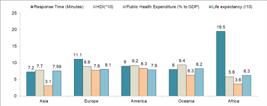Abstract
The growth of the urban population raises concern about municipal public managers in the sense of providing emergency medical services (EMS) that are aligned with the needs of prehospital emergency medical care demanded by the population. The literature review aims at presenting the response time of emergency medical services in several parts of the world and discussing some factors that interfere in the result of this indicator such as GDP (Gross Domestic Product) percentage spent on health and life expectancy of countries. The study will also show that in some of the consulted articles, authors suggest to EMS recommendations for decreasing the response time using simulations, heuristics and metaheuristics. Response time is a basic indicator of emergency medical services, in such a way that researchers use the descriptive statistics to evaluate this parameter. Europe and the USA outstand in the publication of studies that present this information. Some articles use stochastic and mathematical methods to suggest models that simulate scenarios of response time reduction and suggest such proposals to the local EMS. Countries in which the response time was identified have a high index of human development and life expectancy between 74.7 and 83.7 years.
Key words:
Emergency Medical Services; Ambulances; Emergency Responders

 Thumbnail
Thumbnail
 Thumbnail
Thumbnail
 Thumbnail
Thumbnail
 Thumbnail
Thumbnail
 Thumbnail
Thumbnail




